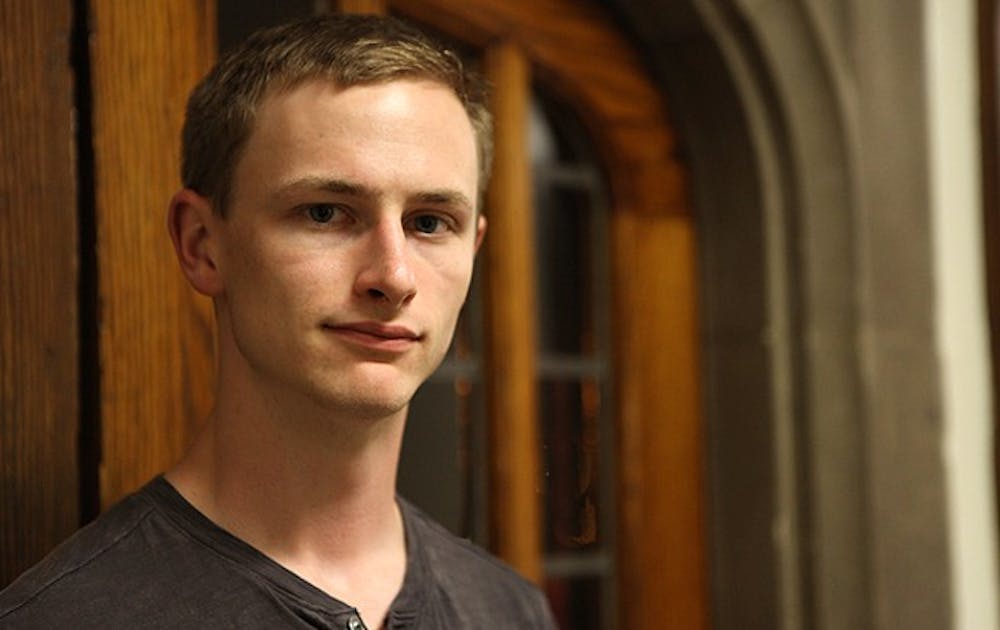When senior Kenneth Hoehn arrived at Duke his freshman year, he walked right into a job in a biology lab. Come this summer, he will leave the lab to continue his research in Oxford as a Marshall Scholar.
Hoehn, a native of Canton, Ga, grew up in a town where evolution was not much discussed. When he discovered evolution in high school, it spurred a desire to study what makes living things the way they are. Upon arrival at Duke as an A. B. Duke Scholar, he earned himself a spot in the lab of Mohamed Noor, Earl D. McLean professor and associate chair of biology, and has already published two papers, with a third on its way.
“He impressed me so much on that first meeting that I said, ‘We have got to get him in our lab,’” Noor said. “I wouldn’t say this about many people, but he’s one where I have full faith that he will absolutely exceed me and blow me out of the water.”
The Marshall Scholarship sends 40 American students each year to the United Kingdom to pursue graduate degrees at the university of their choice. Hoehn will study at Oxford’s Wellcome Trust Centre for Human Genetics. He has not yet decided which of Oxford’s many colleges he will choose as his home.
Hoehn’s interest in biology developed in his childhood, when he spent his time reading field guides and searching for insects in the woods and fields near his house. The community in Canton was a good environment, with some “uniquely conservative elements,” he noted.
“I hadn’t really looked into evolution,” Hoehn said. “It just wasn’t really discussed and when it was discussed, it was understood that the biblical interpretation was the true one.”
That changed for Hoehn in ninth grade, however, when he took a biology course that helped him make sense of nature and the mechanism of natural selection in particular. He started reading books on evolution by writers like Richard Dawkins and Stephen Jay Gould, and thinking about the finer points of how evolution determines which species survive or perish.
“I found that because I spent so much time figuring it out, I gained an understanding of its complexities,” he said. “The more I read into it, the more I started to see that there was more to evolution than just convincing people that it happens.”
The body of knowledge that Hoehn accumulated with the extracurricular reading impressed Noor, who said it was rare for students start in a lab so early in their Duke careers. Hoehn, however, began by helping out in the lab in his first semester at Duke and progressed to researching his own projects by the end of freshman year. Noor said he now operates with the independence of an advanced graduate student.
Suzanne McGaugh, a postdoctoral associate in biology, has been working with Hoehn researching the sex-determining gene for male coffin flies. She said he is the most talented undergraduate with whom she has worked.
“You can just give him a project, and he runs with it on his own,” she said. “He’s got a lot of initiative.”
For his part, Hoehn credits his success thus far with starting as early as possible in a lab and aggressively pursuing expertise in lab skills. Rather than fulfilling all his biology major requirements and graduation requirements before pursuing higher level studies, he began taking graduate-level methods courses as a sophomore and junior. Those, and learning how to program through computer science classes, gave him a leg up in the lab.
The programming allowed him to work more efficiently and explore the study of bioinformatics, or computational biology. Programming is becoming increasingly important in the natural sciences, he noted, as data sets become larger and larger.
“It seems so much of your ability to do effective research depends on how much you know the technology to do it,” Hoehn said. “It’s probably better to learn the techniques you need to know early and apply them than to get everything finished [for the major] and try to squeeze something in later.”
After working for a year watching fruit flies have sex, Hoehn said he discovered the need to accept failure in the pursuit of science. The project involved tracking a particular gene through generations of two populations of fruit flies, but at the end of the year, he discovered the populations had mixed, contaminating the data.
This discovery came less than a month before he was slated to present his findings at an international evolutionary biology conference.
“I didn’t really have a whole lot of time to feel sorry at that point,” Hoehn said.
Instead, he quickly channeled his energy into a different research project, which he completed in time to present, and which later formed the basis for his first publication.
“One of the most important qualities for a scientist is tolerance of frustration and failure, because it happens so often, so you have to process your grief quickly and move on or try it again,” he said.
The resulting paper earned him a second authorship. Since then, he followed up with a primary authorship and is expected to publish another paper as primary author before graduating.
“Most graduate students don’t have that level of publications until they finish up their Ph.D.,” McGaugh said. “If he stays as a researcher in biology, I have no doubt he’ll change the way we think about fundamental problems in biology.”
Get The Chronicle straight to your inbox
Signup for our weekly newsletter. Cancel at any time.

